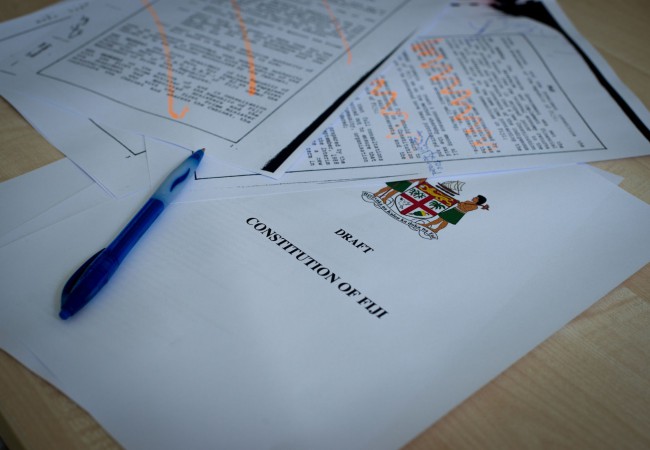
Constitutional Questions
Commodore Bainimarama addressed Fiji March 21st, informing the nation that the draft constitution [pdf] had been released.
He reiterated his commitment of holding elections in September 2014 and stated that the constitution would be completed by April 12th of this year.
Instead of presenting the draft document to the Constituent Assembly, which was the plan under the previous arrangement, Bainimarama said he would present it directly to the people. Without elaboration he suggested that,
“Unfortunately this modification has been forced upon us, because of the lack of commitment by political parties to register under requirements of the law. There are allegations of fraud and impersonation. This does not provide a conducive climate to hold a constituent assembly.”
Committees such as the Constituent Assembly are about having verifiable discussions and processes. They assist in keeping public processes transparent and can help condense the voices of a large population, making the task of amending things simpler for leadership.
However, Bainimarama expressed his desire to consult directly with Fijians and he outlined options for them to share their views on the draft constitution, including:
– Email: feedback.fiji.cons@gmail.com
– SMS: Text feedback to 02. This service is available to both Digicel and Vodafone customers at 5 cents a text.
– Facebook: Look for the “Constitution” tab on the Ministry of Information’s Facebook page.
– Public Forums: Details yet to be announced
– Mail: To the Office of the Solicitor General, Level 7 Suvavou House, Victoria Parade, Suva, P.O. Box 2213 Government Buildings Suva
The Ministry of Information’s Facebook page states,
“The Prime Minister has invited all Fijians to participate in the formulation of Fijis new constitution by providing their feedback on the draft document. Fijians are urged to read it, discuss it, and debate it. We want to know what you think. To provide us with your feedback, simply add your comments below. The deadline for the feedback period is April 5th, 2013.”
There is an inherent attraction toward the underlying concept of talking directly with the people and direct dialogue is a great thing.
But what remains to be seen is whether the regime is willing and able to back up such noble ideals with the supporting structure necessary to provide for such inclusive participation. The other key factor is whether the people of Fiji themselves are willing and able to not only participate, but if necessary, act creatively and strategically to ensure their voices are heard and acted upon.
This is not supposed to just be a petition. Fiji’s interim government maintains that this is a consultation – where everyone should be able to transparently communicate and affect changes. This implies that people should be able to see and hear what others are saying, and monitor what, if anything is being done in response.
For example, lets imagine that 50,000 Fijians write emails, and of those people, 20,000 people voice their concerns about a specific section of the constitution. What happens next? Is there a mechanism whereby the public will ever know that these people complained, and about which part of the constitution? All Fijians should have the opportunity to read the opinions and arguments put forward by their fellow citizens.
Direct democracy via mobile and internet technology is a worthy goal, much sought after by progressive policy advocates. But it is worth asking whether and how the process taking place in Fiji could be improved. A couple of key questions spring to mind:
– Is it realistic to suggest that the government can compile, analyse and consider all submissions, and then amend the constitution accordingly, in just one week (between April 5th and April 12th)? Deadlines are important, but is a week enough time to complete a document that will frame everything in the nation into the future?
– A broad cross-section of society is being included in the discussion but are Fiji’s most vulnerable included – especially those in the most remote areas of the country?
For the public consultation process to have the best chance of achieving a broadly agreed constitution, the people need to be aware of what everyone is saying. They deserve the opportunity to share thoughts and ideas openly and, where possible, to find a common voice that can be reflected in a document that will guide the nation for generations to come.
No matter where one stands on the current regime, right now there is an opportunity to publicly discuss and debate the contents of the draft constitution. And there is a reasonable chance that this constitution will continue to exist in some way, shape or form, whether or not Bainimarama is in power after 2014.
An honest, critical look at the draft constitution before us, should be the primary focus of all Fijians. As such, it is also worth considering whether arguments will have a better chance of being heard and progressing if they can be made in such a way that all Fijians, regardless of their political stance, will read and consider them. If discussions can be framed in this way, they will perhaps be more likely to affect change.
No process is perfect and the timeframe is certainly short but hopefully, this experiment in direct democracy will motivate everyone to share their views and seek creative ways to increase transparency, influence public discourse and put more pressure on those in power to act on the wishes of the people.
